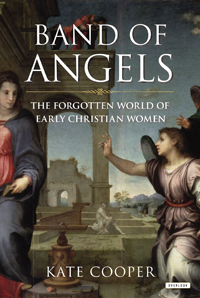Book Notes
 Kate Cooper, Band of Angels; The Forgotten World of Early Christian Women (New York: The Overlook Press, 2013), 342pp.
Kate Cooper, Band of Angels; The Forgotten World of Early Christian Women (New York: The Overlook Press, 2013), 342pp.
In two previous scholarly monographs, Kate Cooper examined the role of virginity, women and the family in early Christianity and ancient Roman society — The Virgin and the Bride (Harvard University Press, 1996) and The Fall of the Roman Household (Cambridge University Press, 2007). She's the perfect person to write this different type of book — written at a popular level for a general audience. She personalizes this history in her preface by recalling her relationship with her own mother.
Writing about the mothers and daughters of the early church is difficult. Roman antiquity was a man's world in which most (but by no means all) women were invisible to history. There's a paucity of sources. It's often difficult to know whether to read the sources we do have as historical truth, pious fiction, or some combination of the two. Cooper acknowledges that there are many "unanswerable questions" in this work of historical recovery, and that in some ways this book is "an exercise of the imagination." But all along the way we're in the hands of a careful scholar who's passionate about her subject.
Cooper writes about women from all walks of life, beginning with Chloe, who's mentioned only one time in the Bible (1 Corinthians 1:10–11), and the many women who are "everywhere in the gospel of Luke." Some of these women were unknown peasants. Others were business owners, desert monastics, slaves like Blandina, martyrs like Perpetua (who kept a prison diary that has survived), mothers of famous men like Helena (mother of Constantine), and empresses. Some were super wealthy patrons of the church, like Olympias and Melania the Elder. Proba was a poet. Whatever their social location, they all shaped the first five hundred years of Christianity in countless ways.


